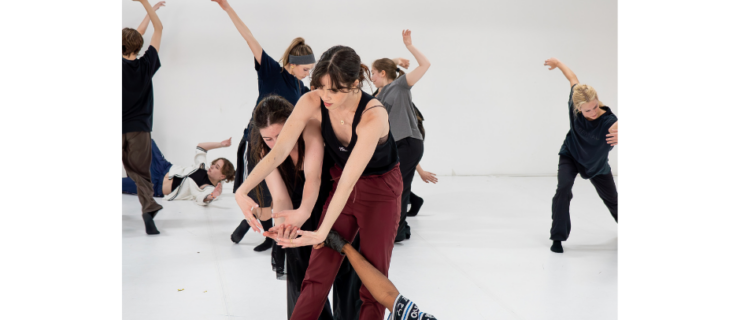Twyla's New Piece Flies…………but
What a ride Come Fly With Me is! It’s great to see Twyla Tharp return to Frank Sinatra, and she gives his songs such zing. The women are luscious, totally in charge of their sexuality. This piece is midway between Nine Sinatra Songs and Movin’ Out in terms of narrative. Instead of a series of duets as in the former, Fly keeps circling back to four couples, tracking the changes in each relationship. And instead of a full plot like the latter, it uses Sinatra’s lyrics mostly for mood, not to advance a plot.
What knocks me out more than the music-and-dance fit, more than the dazzling choreography, is how Twyla has created roles that celebrate the individuality of each dancer. Charlie Neshyba-Hodges, as a lowly busboy, ushers us all into this glamorous joint with a nearly-nothing shrug. Of course (some of us know) he will set off technical fireworks later on. But his character—a shy, self-effacing guy in love—is perfect for him. And Laura Mead makes a wonderful partner to his innocence.
Karine Plantadit’s charisma almost blots out everything else when she’s onstage. But then you get used to her being the life of the party, and the party goes on. She’s sexy in an all-out devil-may-care way—she’ll dance with anyone—but still pays attention to every leap and dive and twist. In my experience, she has always been larger than life onstage.
The big news is Holley Farmer, who has been transformed into an elegant femme fatale, just as sexy as Plantadit, but in an entirely different way—oozy and classy and utterly beguiling. She’s classy cuz she is so queenly, but she’s also classy cuz she wants just one guy: John Selya. It’s hard to see why, cuz he plays it so tough, more like a gambler from Guys and Dolls (which is how he has been spending is onstage time) than like the sensitive Eddie from Movin’ Out. (In fact, he acts downright pimp-like at times.) But he has a nice solo number, to “The September of My Years,” that gives him more depth.
As terrific as the women are—beyond terrific really—part of me is wistful for that time in the early 70s when Twyla’s women were strong, gutsy, and independent. Most of her female characters since Movin’ Out have been more or less seductive, sometimes feisty, but always defined by men. OK, I know it’s a different time now, but was the feminist movement just a blip in the 70s? Do all great female dancers have to ooze and sass around men? Or is this just how you get to Broadway?
Even so, when/if Come Fly With Me (now at the Alliance Theare in Atlanta) comes to Broadway, I’ll have a great time seeing it there like everybody else.
Karine Plantadit, center stage, photo by Greg Mooney, Courtesy Come Fly With Me




